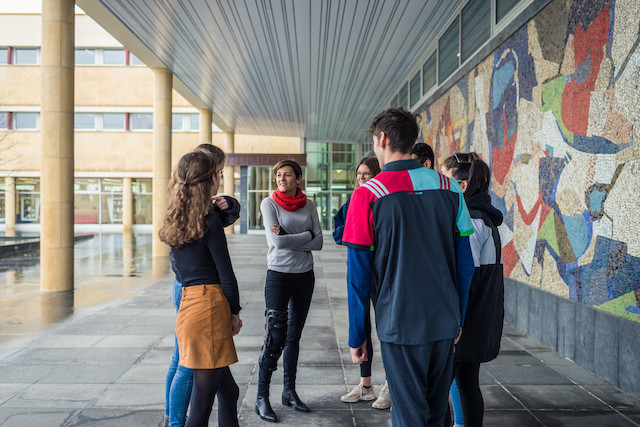The Athénée has been running international classes since 2007 and now has a complete secondary programme that leads up to the International Baccalaureate diploma. The years 7 to 11 programme was put together by Joanne Goebbels and her team of teachers, based on books that are used in different countries. “Since we are a public school, there are also some requirements from the ministry of education,” explains Goebbels, who is now vice principal and coordinator of international classes at the school.
For instance, every student has to take French as a first foreign language. “We start from scratch in years 7 and 8, but after that, you have to have some basics.” Students also have three years of Luxembourgish, learning the basics of speaking and reading and some writing. “It is also a good chance to get a basic knowledge of Luxembourg culture, for integration purposes.” They can also learn German from year 10 onwards.
The international section is home to 200 of the 1,500 students at the Athénée. Students from both streams do get to interact in sports and projects like conversation tables allowing them to help each other in language learning. Extra-curricular activities, such as music or debate clubs, are also open to students from the international and national systems. What’s more, some international section students have come from the national school system.
Many students from the national system applied originally because they thought dealing with lessons in English would be easier than taking them in French, as required in Luxembourg public schools. But that number has dropped off slightly over the last few years, says Goebbels. But the Athénée still attracts students from some of the private international schools, chiefly because it does not charge fees but also, Goebbels has heard, because some parents are concerned about what will happen after Brexit to their children at the European School or they prefer the IB to the British A-level--though Goebbels doesn’t believe there will be any issue really. “But then again we are also the Athénée, and it has a reputation.” Indeed, the school is regarded as one of the best in the country and has regularly turned out students who go on to a career in government.
“The big difference with an IB diploma is that students learn to work autonomously,” says Goebbels. They need to be able to adapt the knowledge they acquire to different situations and must show critical skills. They also have to write an extended 4,000-word essay in their final year and have to hand in internal assessments at specific dates. “Universities see the quality of that work and know that IB students are prepared for what is expected of them at university level. They know how to do research, how to structure an essay, how to do quotations, how to deal with deadlines…”
In addition, IB students take 6 subjects--3 at a high level and 3 at standard level--which means students are not closing as many doors as choosing very specific subjects. Those who focus on sciences in the IB programme, for example, also have to take two languages and one humanities course. “You can still change orientation because you have a broader education,” says Goebbels. Students often get conditional and even unconditional offers from some very good universities. There is a growing trend for students to choose universities in the Netherlands, because of the uncertainty of Brexit and also because fees there are still significantly lower than in the UK. But many Athénée graduates are still choosing to carry on their education in Britain, says Goebbels. Some also head to the United States and Canada.
As a public school, the Athénée currently only employs teachers who have qualified in Luxembourg, which means there are no native English speakers as such. “Some of them have family who are English speaking, or they studied in an English-speaking country.” The Athénée would have to make a specific request to recruit from outside the Luxembourg system, a move that, for now, Goebbels is reluctant to take as long as they have different contracts from those who have qualified in the grand duchy. On the other hand, the Lycée Michel Lucius and the public European schools have hired teachers who qualified abroad, and Goebbels says she has not heard of any difficulties.
Goebbels, who has taught in both systems, explains that unlike the Luxembourg school system, IB exams are evaluated externally. The examiners are monitored, and must meet certain standards, otherwise the entire batch of papers they are marking is sent to another examiner. “This gives quite an objective result in the end.”
This article was originally published in the April-May 2019 edition of Delano Magazine.
